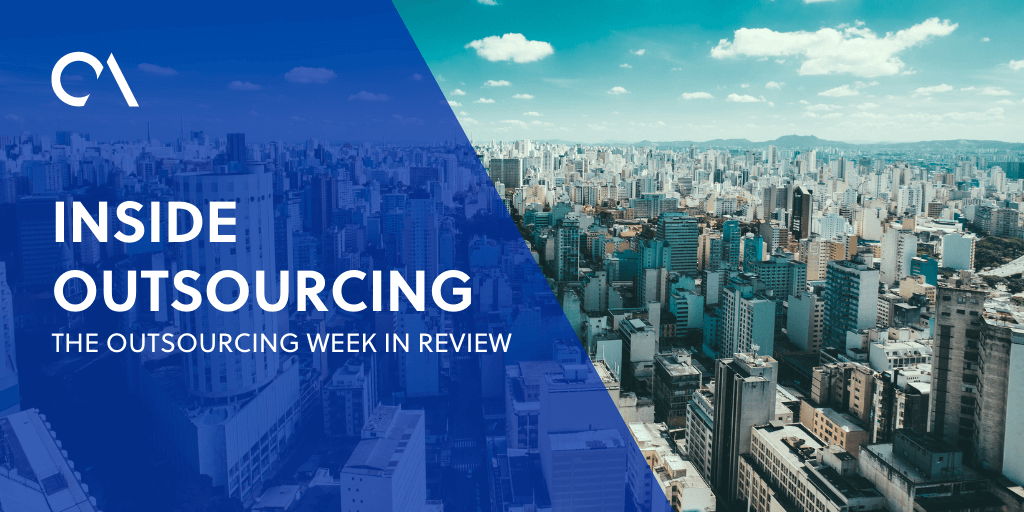Welcome to Inside Outsourcing: The Outsourcing Week in Review
THE WEEK IN REVIEW
Western corporations are turning to outsourcing firms to avoid large inflation rates in their own countries, according to Winston Ong, CEO of outsourcing firm BruntWork. In an APN News report, Ong said that the 10.6% growth of the Philippine Business Process Outsourcing (BPO) industry is only the beginning as global companies start to increasingly outsource their operations. Earlier this month, the IT and Business Process Association of the Philippines (IBPAP) reported a “stronger than expected” expansion in the 2021 Philippine outsourcing space, with full–time outsourcing agents also rising by 9.1% to 1.44 million.
Foreign investors are moving beyond Metro Manila to find the suitable talents. Property services company Colliers Philippines said that Bacolod City has the potential to capture additional demand from large global BPO companies as they have the manpower and infrastructure to support the sector. Colliers encourages outsourcing firms who are planning to locate in the city to partner with the government-run Negros Occidental Language and Information Technology Center (NOLITC) to ensure a steady supply of BPO-ready college graduates. Among the major outsourcing players already in Bacolod City are Ubiquity, Teletech, Teleperformance, Convergys, Transcom, and PanAsiatic Solutions.
With all these projected developments, IBPAP said that their member companies would not likely sacrifice their tax incentives despite the Department of Finance’s (DOF) appeal. In an interview with One News PH, IBPAP President Jack Madrid said that providing tax incentives is a “very important factor” for continued investment in the Philippines. Madrid added that the decision of BPO giant Concentrix to forego its tax benefits stemmed from the company’s decision to heed its employees’ wishes to resume remote work. The IBPAP chief stated that they continue to be in dialogue with the current and incoming administrations on the importance of flexibility in the workplace, especially in the post-pandemic era.
Online recruitment in the Philippines rose by 11% year-on-year in April 2022, according to data from the Monster Employment Index (MEI). Among industries, the BFSI (Banking, financial services, and insurance) took the lead in online hiring activities as it jumped by 26%. It is also the industry that charted the steepest increase in demand for talent annually. The retail industry and entertainment sector took the second and third spot on the list with 22% and 13%, respectively. On the other hand, the logistics, education, and hospitality industries took a hit as recruitment went down by 20%, 10%, and 5%, respectively. Speaking of recruitment, 46% of Filipino millennials are considering taking career shifts this year, with many considering a move into the highly-lucrative BPO industry. According to tech giant Microsoft, this trend might be due to evolving views toward the hybrid home and office work setup in the country. The report also stipulated that 20% of Filipino workers have already left their jobs in the past year due to personal well-being or mental health, work-life balance, risks of COVID-19, and lack of flexible work hours or location.
The Philippines can expect more than P500 billion (US$9.22 billion) worth of investment pledges in the next 18 months, said outgoing Department of Trade and Industry (DTI) Secretary Ramon Lopez. In a statement, Lopez explained that these pledges are “in various stages of preparation, site identification, company registration, and IPA (investment promotion agency) application.” Most of these pledges fall under manufacturing, electronics, satellite services, data centers, and renewable energy projects. Investments related to the Information Technology and Business Process Management (IT-BPM), healthcare, animation, IT design and engineering, logistics, marine services, and transshipment operations are also set to happen in the next few months.
Leading the charge is Philip Morris International’s (PMI) new global business service (GBS) hub in Manila. Registered under the name PMI Business Solutions Inc. (PBS), the tobacco company’s GBS hub will render integrated business solutions to PMI affiliates in the Asia-Pacific and European regions. It is also expected to open hundreds of fresh job opportunities in the Philippines within three years. Meanwhile, fiber internet provider Converge ICT Solutions will be expanding its call center operations in Pampanga to meet the growing demand for its services. The expansion — conducted through its partner company Universal Access and Systems Solutions (UAS Solutions) — is set to grow its agent seats to over 1,000 with a year-on-year increase of about 80% by the end of 2022. Converge CEO Dennis Uy said that extending its PH footprint will give “much-needed employment” in Pampanga.
At the same time, BPO provider iQor is looking to add 100 more employees in its Iloilo branch to serve Canadian telecommunications clients. iQor Senior Director of Operations Tony Rizkallah said that they are confident that this expansion will bring growth to their telco business as their Ilonggo workforce delivers outstanding service and results to their clients. The firm promised to provide a one-time bonus of P60,000 (US$1,122) and a “competitive” compensation package to successful applicants.
In other industries, energy equipment and solutions provider Amber Kinetics is set to complete its second manufacturing plant of the kinetic energy storage system (KESS) in the Philippines by year-end. In a media briefing, Amber Kinetics Philippines Director for Business Development Roberto Kanapi said that the new line will cater to the increasing demand of their Philippine and Australian clients. The Philippines is becoming a potential market for energy storage systems as the country works on increasing its share of renewable energy to 35% by 2030 and 50% by 2040. Lastly, Malaysia-based telecommunications service provider edotco Group Sdn Bhd is looking to further expand its presence in the Philippines as they acquire nearly 3,000 towers from telco giant PLDT. In an interview with The STAR, edotco Philippines Acting Country Managing Director Suraj Narayanan said that this acquisition turned them into “the largest tower company in the Philippines” which, in turn, made them instrumental in shaping and developing the communications infrastructure in the country while creating value for its stakeholders. ISOC edotco Towers Inc., a subsidiary of the edotco Group, acquired 2,973 telecom towers through a sale and lease back transaction with subsidiaries of PLDT.
In line with the edotco news, several telecommunication tower companies operating in the Philippines agree that the entry of satellite firms in the country is not a threat to their business. In an interview with Business World, edotco Group CEO Adlan Tajudin said that some areas in the country — particularly the rural parts — “will be best served by satellite technology.” iSON Tower Ltd. Country Manager Rahul Singh explained that satellite connectivity companies are not considered to be a threat to traditional telecommunications operators as it will only roughly three to four per cent of the customers that traditional providers find “most difficult to reach.” The National Telecommunications Commission (NTC) recently approved the registration of Starlink as a value-added service provider (VAS) as it promises to bring cost-effective internet access to remote areas in the country.
With all these exciting investments, a new combat started between the DOF/FIRB and the Philippine Economic Zone Authority (PEZA). A report given by the Fiscal Incentives Review Board (FIRB) Secretariat to the DOF stated that PEZA had not tracked the inflow of actual investments made by its member companies since the implementation of the Corporate Recovery and Tax Incentives for Enterprises (CREATE) Act. As a result, PEZA reportedly presented inadequate information regarding its locators’ investment capital and market orientation to the FIRB. FIRB Secretariat Head Juvy Danofrata stated that 12 of the 196 PEZA-RBEs lacked information on their investment capital, and 11 did not indicate their market orientation. PEZA Director-General Charito Plaza denied the claims and said that the FIRB’s statement is particularly “erroneous, misleading, and intends to embarrass PEZA as an investment promotion agency (IPA).”
In economic news, think tank Japan Center for Economic Research (JCER) kept its 2022 Gross Domestic Product (GDP) growth forecast for the Philippines at 7.1% —the highest in the ASEAN-4 region. JCER said that this is due to the country’s stronger-than-expected 8.3% economic expansion during Q1 2022. JCER expects the second-quarter GDP to grow 8.7%; the third quarter by 6.9%; and the fourth quarter by 4.8%on waning low-base effects. The think tank’s 2022 growth forecast for the Philippines was higher than its projections for other ASEAN-4 countries — namely Malaysia (5.4%), Indonesia (4.7%), and Thailand (3.5%).
Moreover, the Philippines went up four places to the 48th spot in the 2022 IMD World Competitiveness Ranking. World Competitiveness Center Chief Economist and Head Of Operations Christos Cabolis said that economic recovery was the “most important aspect” of the country’s rank improvement. The increase in international investments and employment also led to positive sentiment among business leaders in the Southeast Asian nation.
A good sign!

Thursday, June 23, 2022
NEWS THIS WEEK
22 June 2022
- BSP chief confident in PH’s removal from FATF gray list – read article…
- Outsourcing to PH up 10.6% in 2021– read article…
- PH to build world’s largest solar project – read article…
- PH maintains bilateral FTA with Iceland, Norway – read article…
21 June 2022
- Over P500Bn investment pledges expected in the next 18 months — DTI – read article…
- 46% of Filipino millennials are shiftings toward the BPO industry – read article…
- PH inflation could hit 8% as the Russia-Ukraine war continues – read article…
- PH COVID-19 daily case average up 82% – read article…
20 June 2022
- PH climbs four spots to 48th in world competitiveness ranking – read article…
- Entry of satellite firms in PH ‘not a threat to tower providers – read article…
- JCER keeps 7.1% 2022 GDP forecast for PH – read article..
- edotco expands PH operations following PLDT deal – read article..
17 June 2022
- iQor to generate more jobs in Iloilo – read article…
- PH online hiring up 11% in April – read article…
- Converge to expand call centers to Pampanga – read article…
- Bacolod to capture demand from more global BPOs — Colliers – read article…
16 June 2022
- BPOs unlikely to forego tax perks — IBPAP – read article…
- DOF: PEZA is clueless on local investments – read article…
- Amber Kinetics expands operations in PH – read article…
- PMI invests in new GBS hub in Manila – read article…

 Independent
Independent





















